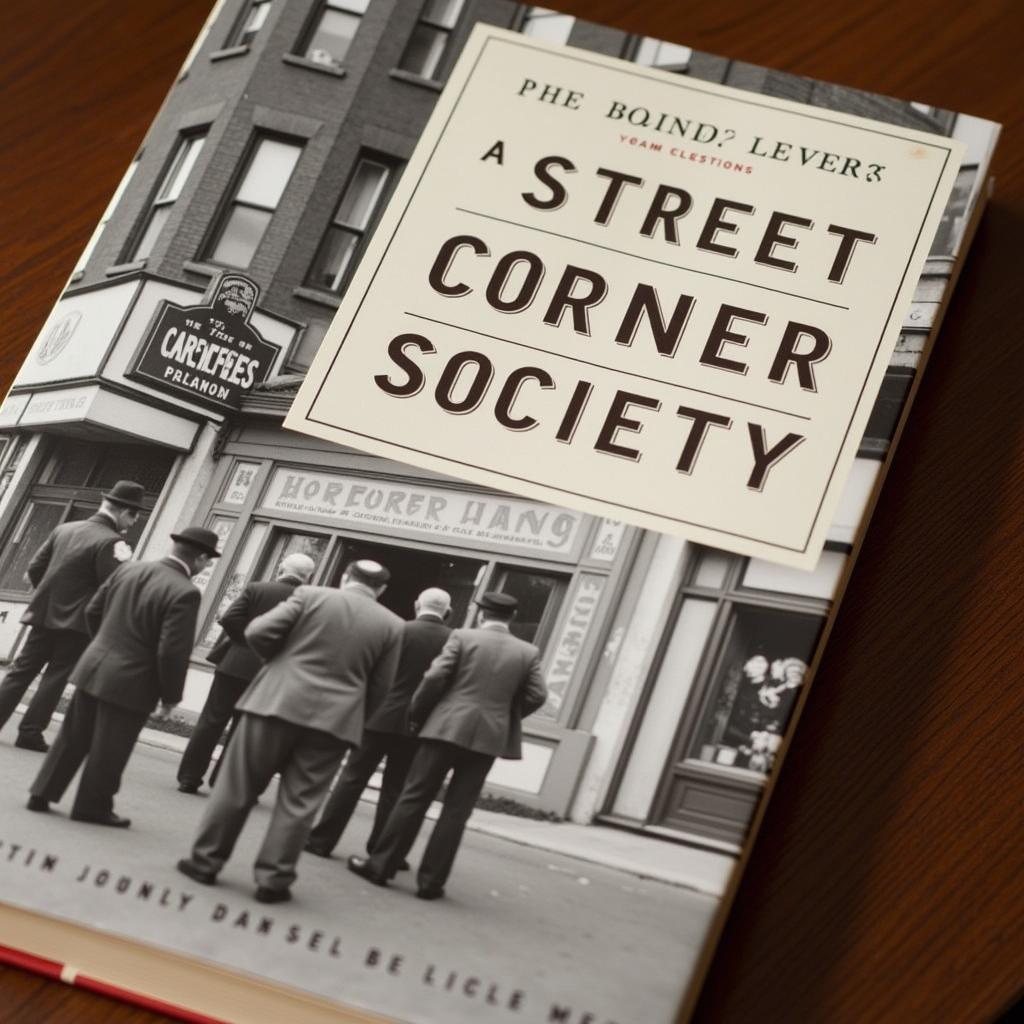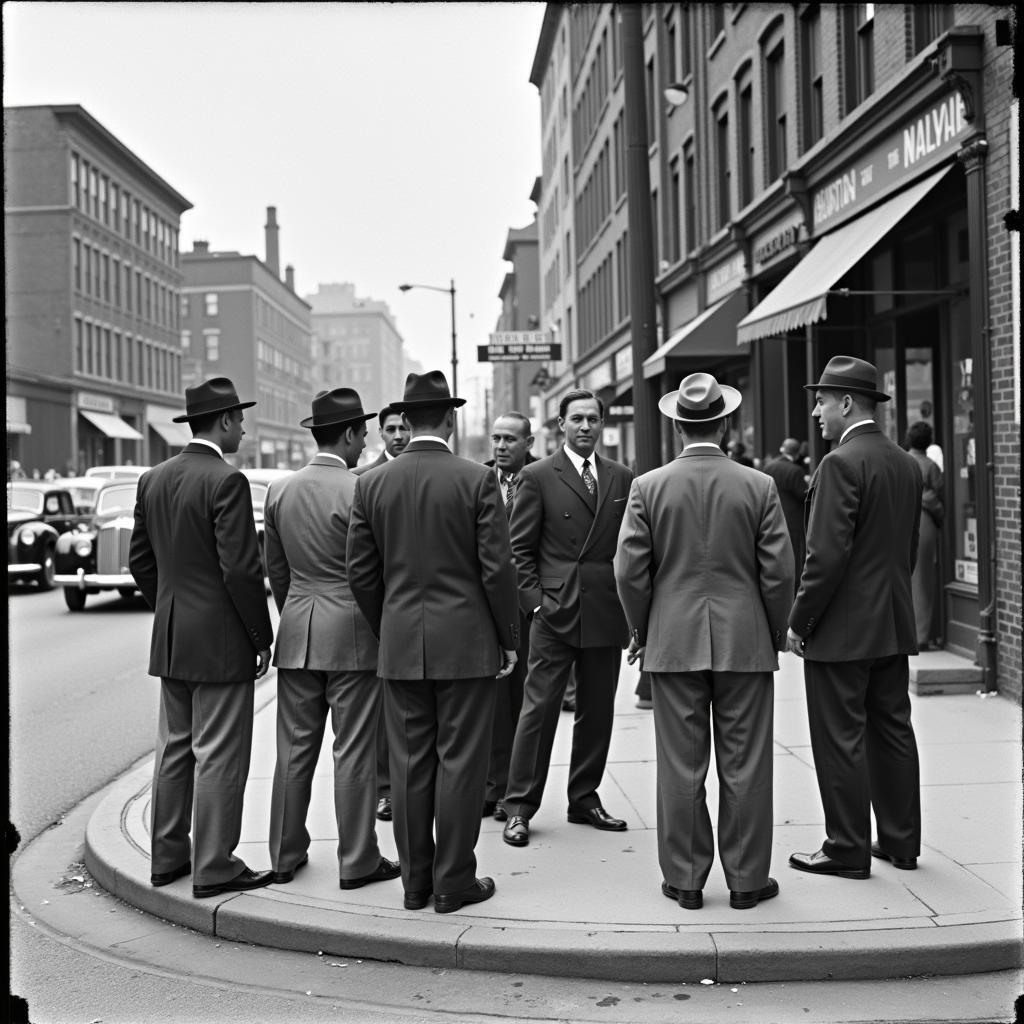William Foote Whyte’s “Street Corner Society” is a groundbreaking work of urban sociology, offering a detailed and intimate portrait of an Italian American community in Boston in the late 1930s. This immersive study challenges preconceived notions of slum life and provides valuable insights into the social structures, hierarchies, and dynamics that shape urban communities. The book’s enduring relevance stems from its meticulous observation and nuanced understanding of human interaction within a specific social context.
The central focus of “Street Corner Society” revolves around two groups: the Nortons, a group of upwardly mobile young men engaged in various social activities, and the less successful corner boys, who spend their time on street corners. Whyte’s participant observation method allowed him to immerse himself in the community, gaining the trust of the residents and observing their daily lives firsthand. He participated in their activities, listened to their conversations, and gradually became an accepted member of their social circles. This intimate approach provided him with a unique perspective on the community’s internal dynamics and power structures. For instance, the importance of social standing and the role of the leader, “Doc,” are explored with intricate detail. Whyte’s careful analysis reveals how social capital and connections influence individual opportunities and aspirations.
Understanding the Impact of “Street Corner Society”
“Street Corner Society” is more than just a historical account; it’s a lens through which we can examine the persistent social issues that continue to shape urban life. The book highlights the importance of social organization, leadership, and community bonds in navigating the challenges of poverty and discrimination. It also raises questions about the role of social scientists in community development and the ethical implications of immersive research.
 Street Corner Society Book Cover
Street Corner Society Book Cover
This groundbreaking study revolutionized sociological research methods, demonstrating the power of participant observation in understanding complex social phenomena. Whyte’s detailed accounts of the daily lives of the Nortons and the corner boys challenge simplistic narratives about poverty and crime, revealing the intricate social structures that govern these communities. He illustrates the importance of understanding local cultures and the dynamics of social interaction in crafting effective social interventions.
Delving into the Themes of Community and Identity
The concept of “social capital” is central to understanding Whyte’s work. He demonstrates how social connections and networks can provide access to resources, opportunities, and support within a community. For example, he observed how “Doc,” the leader of the Nortons, leveraged his social influence to secure jobs and advocate for his group. This observation underscores the significance of informal leadership and the role it plays in shaping individual trajectories within marginalized communities.
sheraton in philadelphia society hill
The book also explores the complex relationship between individual identity and community belonging. Whyte’s meticulous observations reveal how social status, group affiliation, and the dynamics of power within the community shape the self-perception and aspirations of its members. He demonstrates how individuals negotiate their identities within the context of their social environment and how these identities influence their life choices and opportunities.
Why is “Street Corner Society” still relevant today?
The themes explored in “Street Corner Society” resonate with contemporary urban challenges, making it a valuable resource for understanding issues such as social inequality, community development, and the role of social capital in individual success. While the specific context of the Italian American community in 1930s Boston may seem distant, the underlying dynamics of social interaction, group dynamics, and leadership remain remarkably relevant. By studying these dynamics, we can gain valuable insights into the complexities of urban life and the challenges faced by marginalized communities today.
What are some key takeaways from “Street Corner Society”?
- The importance of understanding local culture and social structures.
- The power of participant observation in sociological research.
- The significance of social capital and networks in community life.
- The complex relationship between individual identity and community belonging.
- The enduring relevance of social organization and leadership.
“Street Corner Society”: A Timeless Contribution to Sociology
In conclusion, “Street Corner Society Book” provides a nuanced and compelling account of urban life, offering valuable insights into the social structures, relationships, and dynamics that shape communities. The book’s enduring legacy lies in its meticulous observation, insightful analysis, and profound understanding of human interaction within a specific social context. By exploring the complexities of community life, “Street Corner Society” challenges our assumptions and encourages a deeper appreciation for the social forces that shape individual destinies.
 Street Corner Scene in 1930s Boston
Street Corner Scene in 1930s Boston
Expert Insight:
- Dr. Maria Rossi, Urban Sociologist: “Whyte’s work is a cornerstone of urban studies, demonstrating the importance of understanding community dynamics from the inside out.”
- Dr. Anthony Lombardi, Community Development Specialist: “”Street Corner Society” remains a powerful reminder of the role social connections play in individual success and community well-being.”
- Professor Elena Esposito, Social Historian: “The book’s lasting impact lies in its ability to humanize the lives of those living in marginalized communities, challenging stereotypes and promoting empathy.”
FAQ
- Who wrote “Street Corner Society”? William Foote Whyte.
- Where does “Street Corner Society” take place? Boston’s North End.
- What is the main focus of the book? The social structure of an Italian American community.
- What research method did Whyte use? Participant observation.
- Why is the book still relevant today? It offers insights into enduring urban challenges.
- What is the concept of “social capital”? The value of social networks and relationships.
- What are the Nortons and the corner boys? Two groups within the community studied.
Some other questions you might have are about the ethical considerations of Whyte’s research methods and the long-term impact of his work on the community he studied. You can find more information on our website, including articles on related topics such as urban sociology, community development, and social justice.
When you need assistance, please contact Phone Number: 02043854663, Email: [email protected] Or visit address: Khu 34, Bac Giang, 260000, Vietnam. We have a 24/7 customer service team.